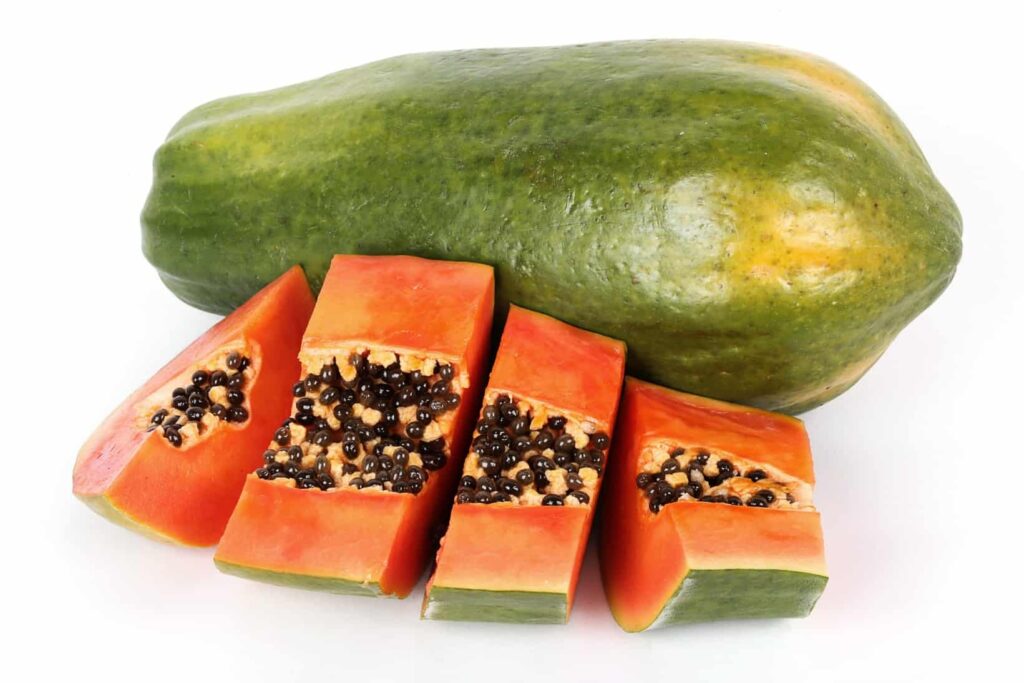Papaya, scientifically known as Carica papaya, is a tropical fruit cherished for its vibrant color, sweet taste, and remarkable health benefits. Originating from Central America, papaya has now become a globally recognized superfruit, prized not only for its delicious flavor but also for its rich nutritional profile and potential therapeutic properties. This article delves into the extensive health benefits of papaya, exploring its vitamins, minerals, enzymes, and bioactive compounds that contribute to overall well-being.
Nutritional Profile of Papaya
Papaya stands out as a nutritional powerhouse due to its impressive array of vitamins, minerals, and other nutrients. A typical serving of papaya (about 1 cup of cubed fruit) provides:
Vitamin C: Papaya is renowned for its high vitamin C content, which is essential for immune function, collagen synthesis, and antioxidant protection against oxidative stress.
Vitamin A: The fruit is rich in beta-carotene, a precursor to vitamin A, promoting healthy vision, skin, and immune system support.
Folate: An important B-vitamin, folate is crucial for DNA synthesis, cell division, and preventing neural tube defects during pregnancy.
Vitamin E: This fat-soluble vitamin acts as an antioxidant, helping to protect cells from damage and supporting skin health.
Vitamin K: Papaya contributes to adequate vitamin K intake, necessary for blood clotting and bone health.
Potassium: An electrolyte mineral that aids in maintaining fluid balance, proper muscle contractions, and heart function.
Magnesium: This mineral supports muscle and nerve function, blood pressure regulation, and bone health.
Dietary Fiber: Papaya contains both soluble and insoluble fiber, which promote digestive health and aid in maintaining a healthy weight.
Health Benefits of Papaya
Digestive Health:
Papaya contains an enzyme called papain, which is known for its digestive properties. Papain assists in breaking down proteins, aiding in digestion and potentially reducing symptoms of indigestion, bloating, and heartburn. The fiber content in papaya also supports regular bowel movements and a healthy gut microbiome.
Anti-Inflammatory Effects:
The presence of various phytonutrients and antioxidants, such as beta-carotene, vitamin C, and flavonoids, contribute to papaya’s anti-inflammatory properties. These compounds help to reduce inflammation in the body, potentially mitigating the risk of chronic diseases like heart disease and arthritis.
Immune System Support:
The high vitamin C content in papaya is essential for a robust immune system. Vitamin C boosts the production of white blood cells, which defend the body against infections and illnesses. Additionally, the fruit’s other antioxidants contribute to overall immune function.
Skin Health:
The combination of vitamins A, C, and E in papaya makes it a wonderful fruit for promoting healthy skin. These vitamins play a crucial role in collagen production, skin repair, and protection against UV damage, helping to maintain a youthful and radiant complexion.
Heart Health:
The potassium and fiber content in papaya contribute to heart health. Potassium helps regulate blood pressure, reducing the risk of hypertension, while dietary fiber aids in managing cholesterol levels and supporting overall cardiovascular function.
Cancer Prevention:
Some studies suggest that the bioactive compounds in papaya, including beta-carotene and other antioxidants, might have anti-cancer properties. These compounds help combat oxidative stress and inflammation, which are factors implicated in the development of certain cancers.
Eye Health:
The beta-carotene in papaya is converted to vitamin A in the body, which is essential for maintaining good vision. Adequate intake of beta-carotene has been associated with a lower risk of age-related macular degeneration (AMD), a common eye condition.
Aiding Weight Loss:
Papaya’s fiber content promotes a feeling of fullness, reducing overeating and aiding in weight management. Its natural sweetness can also satisfy sugar cravings in a healthier way.
Incorporating Papaya into Your Diet:
To harness the health benefits of papaya, consider these tips for adding this tropical delight to your diet:
Fresh Fruit: Enjoy papaya on its own, as a refreshing snack or dessert. Simply scoop out the seeds, peel the skin, and slice the fruit into manageable pieces.
Smoothies: Blend papaya with other fruits, yogurt, or plant-based milk to create delicious and nutritious smoothies.
Salads: Add papaya chunks to your salads for a burst of color, flavor, and nutrition.
Salsas: Create a flavorful salsa with papaya, tomatoes, onions, cilantro, and a dash of lime juice. This pairs well with grilled meats, seafood, or tortilla chips.
Dried Papaya: Consider enjoying dried papaya as a portable and convenient snack.
Papaya Seeds: Some people consume papaya seeds, believing they have potential health benefits. However, consult a healthcare professional before incorporating them into your diet, as they might have certain interactions or side effects.
Conclusion:
Papaya stands as a testament to nature’s bounty, offering a plethora of health benefits through its rich nutritional content and bioactive compounds. From supporting digestion and immune function to promoting heart health and radiant skin, papaya’s contributions to overall well-being are undeniable. Including papaya in your diet can be a delicious and enjoyable way to enhance your health and embrace the vitality of this tropical superfruit. As with any dietary changes, it’s recommended to consult with a healthcare professional, especially if you have allergies, sensitivities, or medical conditions that could be impacted by dietary choices.



